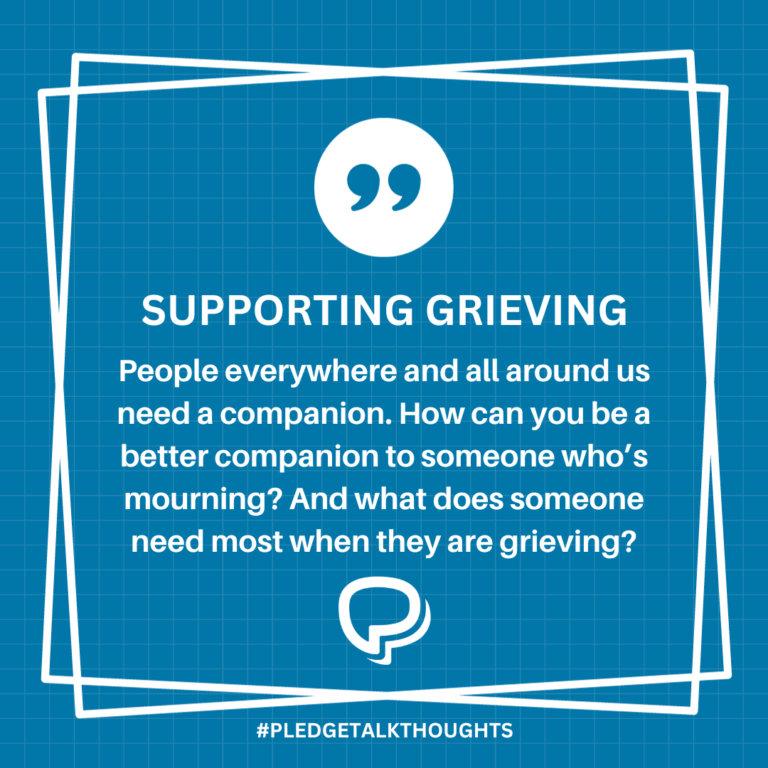Further thoughts on Supporting a Loved One in Mourning: Practical Tip and Guidance:
Image by Sasin Tipchai from Pixabay
What does someone need most when they are grieving? Dr. Alan Wolfelt from the Center For Loss & Life Transition, says they need a companion. In his work, Introduction to Companioning the Bereaved he says the following:
“… the word “companion,” when broken down into its original Latin roots, means “messmate”: com for “with” and pan for “bread.” Someone you would share a meal with, a friend, an equal. I have taken liberties with the noun “companion” and made it into the verb “companioning” because it so well captures the type of counseling relationship I support and advocate. That is the image of companioning—sitting at a table together, being present to one another, sharing, communing, abiding in the fellowship of hospitality.”
I love this.
Com means “with” and pan means “bread.”
When we first moved to Wichita, KS we felt like we were supposed to practically live out what it meant to “Love your neighbor as yourself.” We began by deliberately looking for and actually creating reasons to get to know our neighbors.
My wife baked cookies or bread and one by one, we delivered them to each one who lived on our block as we introduced our family and told them we were glad we got to be neighbors. We instigated the Neighborhood Watch program on our street specifically so we’d have an excuse to invite all our neighbors together and introduce them to each other. We looked for opportunities to be neighborly, helping one neighbor dig out an old stump from his front yard, and babysitting the children of another neighbor. Then along with another couple, we began a neighborhood Supper Club. For years we invited all our neighbors up and down our street and some from around the corner to have a potluck dinner together in our home. We had from 8 to 40 people on any given Wednesday night!
All of us experienced the “com” part (being with) as we “panned” together. We broke bread and had a smorgasbord better than any in town! Significant relationships were established between everyone, and we had numerous opportunities to “companion” each other over time. We laughed together and listened to each other’s stories. We loved on and cried with one person whose brother committed suicide, and with a couple who experienced a miscarriage. We even attended funerals together.
We became like family – because of “companioning.”
What does it mean to be a companion?
Webster’s definition is: “one that keeps company with another.”
Our universal experience might say that a companion is someone who comes over to be “with” us, to enjoy us, to listen to us, to help us, to cry with us, to encourage us, or to go through all or even a portion of life with us.
Here are a few practical thoughts:
- People everywhere and all around us need a companion. Remember at the core of who we are, we are relational beings.
- Though everyone needs a companion, you can’t be a companion to everyone.
- Then who are you to be a companion to?
- In the immediate sense: anyone around you at any given time, starting with those closest to you. Does your spouse, your child, your friend, or your workout partner sense you being “with” them? Do you listen well, seek to be of help, cry (feel) with them what they are feeling, encourage them, and cheer them on? Do you help them feel not so alone in this world?
- In the broader sense: Who comes to mind in your circle of influence who might use a companion especially right now? Look around you. Is someone you know struggling in life? Hurting because of a loss through death, divorce, or distance? Do they sense you care because you are “with” them in this part of their journey?
- Lastly, you need a companion too! It is often hard to admit – even for me – but we also need others to walk with us and help us in our times of need. Again, look around you in your circles of life. Find one person you would most like to be able to be real with about matters of concern in life. Ask them to do lunch or coffee. Share this post with them, and dare to ask if they might be a “companion” and if you could do the same for them.
To watch this week’s video short CLICK HERE!
Mark Oelze, Author/Creator of PLEDGEtalk
In the comments below, tell me one thing you have experienced with someone who was a “companion” to you in some way or another.





Leave a Reply
Want to join the discussion?Feel free to contribute!